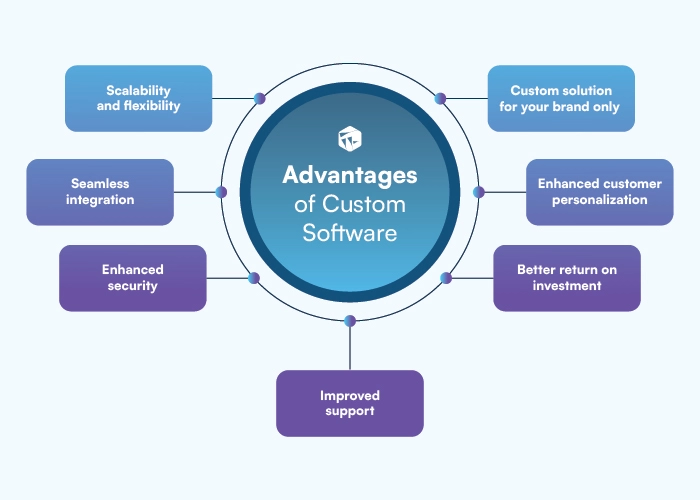The first stage in the process of developing custom software is to understand your business goals and the resources needed to fulfil them.
On rare occasions, a combined solution can complete more than 80% of the tasks needed to support company objectives. People are typically conflicted about whether to pursue custom software development as a result of this situation. The benefits and drawbacks of the bespoke development approach are listed below. With the help of the following factors, you will be able to come to a wise selection.
Risk of Developing Custom Software in a Modern Environment:
If we don’t satisfy people’s perceived wants, we’ll never be able to meet their actual needs.
The saying is that businesses must understand the particular requirements of their workers and customers. The term “business demands” refers to a broad variety of issues, such as making it simpler to integrate with legacy systems, replacing or combining existing solutions at a lower cost, opening up new opportunities, automating specialized business procedures, boosting competitive edge, and more.
When creating custom software application, it can be challenging to strike a balance between conflicting stakeholders, evolving technology, different user types, and other variables. The entire procedure increases the risk of developing custom software, and many businesses would be hesitant to choose this route.
Here is a brief list of some of the risks you should consider when you evaluate your strategy for creating unique software.
1. Misleading objectives and plans:
One of the primary issues while creating custom software is inaccurate aim and objective setting. Without a sound plan of action, the project could take unforeseen turns, and there’s a chance you might lose control of how things come out. To create clear objectives and expectations, you must ask yourself the following questions:
Who the target audience would be for the project?
What problem is this project attempting to address?
Would this be the greatest choice due to efficiency and cost savings?
What long-term benefits will your clients receive? Try coming up with answers to these questions to help you define your goals and agenda.
2. An incorrect project estimation :
Inaccurate project estimation may be the result of poor team communication. Poor communication may make it difficult to accurately identify the initial requirements, which could lead to erroneous budget forecasts. Transparency is also highly valued in custom enterprise software development initiatives.
The project should now involve all of the significant actors. A project manager is required to oversee the project and keep everyone on task. This will help you and your team develop a timeline, budget, and roadmap that adheres to the specifications.
3. Adaptability to External Systems:
In custom business programs, the need to share data with another software program commonly arises. As a result, both applications encourage complexity. If the other application is a piece of commercially available software or an off-the-shelf technology with a disclosed API, the risks might not be large or hazardous. On the other hand, integrating a custom-built system could be both expensive and risky.
4. Fears about safety:
Every other day, it seems, businesses reveal attempted data breaches and security flaws. As a result, every project has a security plan, and every developer who creates unique software applications must be familiar with good coding techniques.
For instance, robust encryption measures are required for content management systems. To ensure excellent development, introduce your code of ethics to your software developers.
5. The potential for new and unforeseen requirements:
Every bespoke software development project needs to have features included to improve the overall application experience. Some projects, however, have vague goals and an undefined scope. Therefore, it’s crucial to include a budget cushion, keep the release objectives in mind, and save new ideas for later.
The Advantages of Developing Custom Software:
Let’s face it: Even when ready-to-use software contains all the components required to handle more complex needs, purchasing, maintaining, and customizing it can be difficult and expensive.
Over time, businesses have realized how inadequate packaged and off-the-shelf products are for addressing a range of business demands. As a premier provider of bespoke software development, we have outlined some key benefits so that you can completely appreciate the potential of doing so.
1. A Successful, Customized Approach:
The purpose of creating custom software is to assist various business operations quickly and efficiently. Despite the abundance of commercially available solutions, the likelihood that they will be simple to integrate into your business is reduced. The quality of the custom solution, which is made just for your business, cannot be matched by modifying some of the built-in capabilities of the present program to suit certain minor requirements. Therefore, a customized solution is perfect for your business.

2. Flexible:
As your business evolves or grows, new needs appear. These new requirements are assessed in light of prospective future demands during the requirement collection phase. The designers and developers of custom software are working on these enhancements to support the continued growth of your business. As a result, you won’t need to buy additional licenses or subscriptions for those functionalities.
3. Lower integration costs:
Using your company’s software development services may occasionally require the usage of other applications or tools. In such cases, your business requires the development of a unique software solution to allow the integration of multiple operations. Working with legacy systems or integrating APIs to improve some functionality may be involved. Custom software can be made to meet integration needs with its intended environment without worrying about spending any additional money on commercial software purchases to work with your current infrastructure.
4. A shorter time to market:
Today’s businesses must change faster than ever before to remain competitive in the ever-evolving world of technology and society. You can shorten the time it takes to launch a product by investing in custom software development. Being the first company to offer such a well-designed application to its consumers can have a noticeable impact on your business growth, particularly if your application idea is unique and captivating and has not been addressed by anyone else in the sector.
If you go with custom outsourcing, all you have to worry about is your own workload and a reliable team. They will therefore not only create it more quickly, but also with considerably better focus and fewer outside distractions from their task.
On the other side, an internal development team will never have enough work, which will hinder the project’s progress and keep it from reaching its goals. The use of custom software development offers an additional benefit.
5. Economic:
Creating custom software solutions might occasionally cost more than buying boxed solutions. Overall, though, it turns out to be a valuable answer because it doesn’t have to be created to satisfy business goals. Depending on the terms and conditions established for the project, you can also own the software and its whole source code. As a result, the product has a competitive edge when it comes to licensing or selling to other companies, making it a successful investment.
6. Individual:
The software development company you choose to buy the software from will have an impact on how well your business does while using commercially accessible software applications . Because of this, if your vendor ceases offering support and maintenance or goes out of business, your business will suffer, and you will need to switch to software that is fully supported and maintained straight soon. This unforeseen spending, for instance, might have a significant negative impact on your P&L.
On the other hand, if you choose a custom software solution, your application will receive continuing support and upkeep.
Is a custom app the best choice for your business?
The benefits and drawbacks of designing custom software are now clear to you. The efficiency and productivity of your business processes affect everything. The important lesson from the story is that you need the right applications to run your business and serve the needs of your customers.
Whatever the use case for your business, be aware of several important elements, including the need for custom software development, your budget, your timeline, and the potential advantages for your business. Your new custom-built application should fix the real problems by eliminating ineffective jobs.
If you choose to create your software, it’s critical to interact with experts in the field who can guarantee effective teamwork and communication.
Our team at Cuneiform consists of software architects, product owners, and developers with years of experience in the software industry and expertise in a range of platforms, including Java, .NET, Open-Source (Python & PHP), and Frontend Stacks (Angular & React). With our knowledge of bespoke engineering and improved understanding of the customer-centric vision, we are here to support you as you embark on the development of your custom software application. Check out Cuneiform’s custom software development services.




